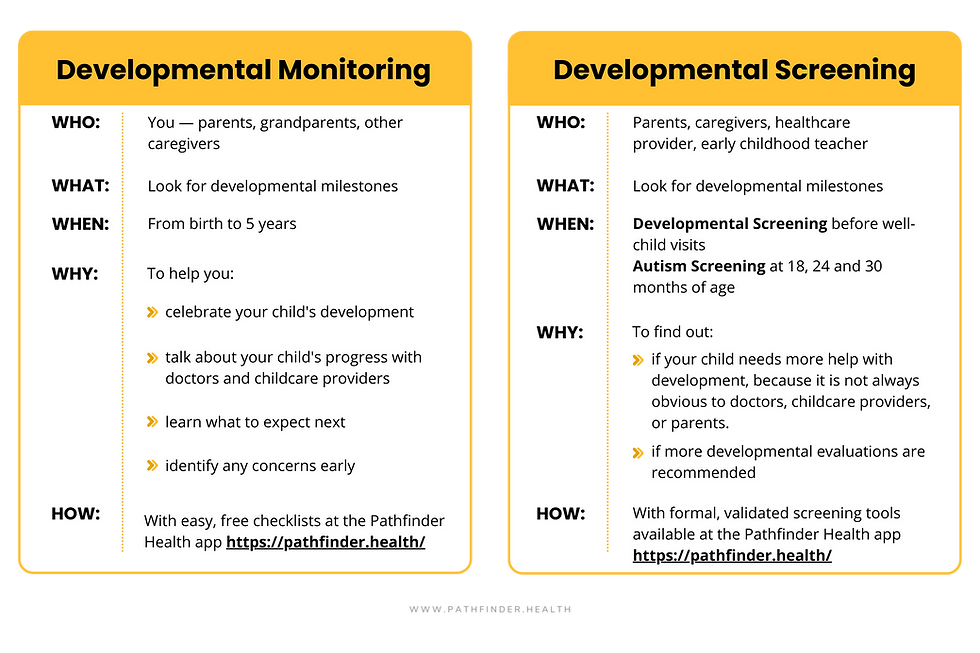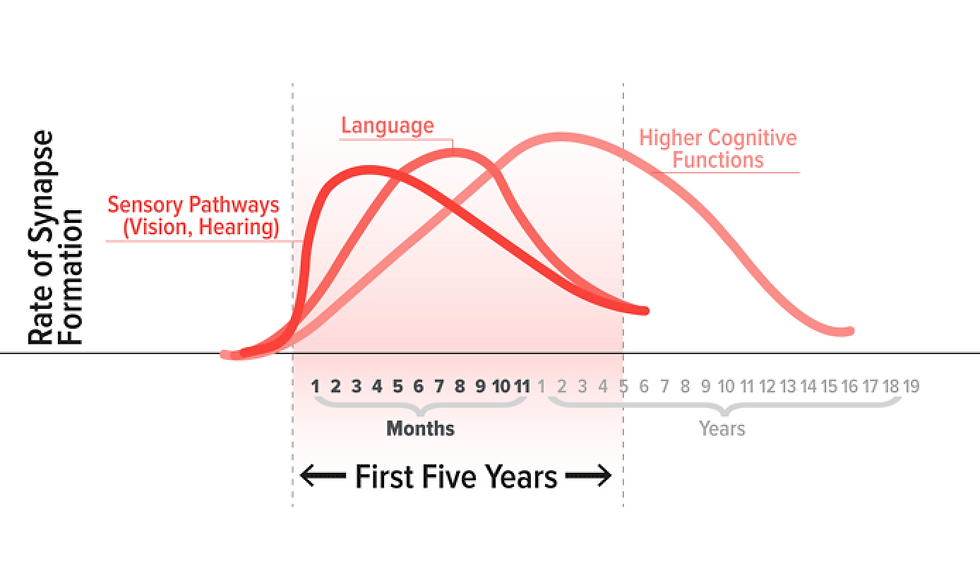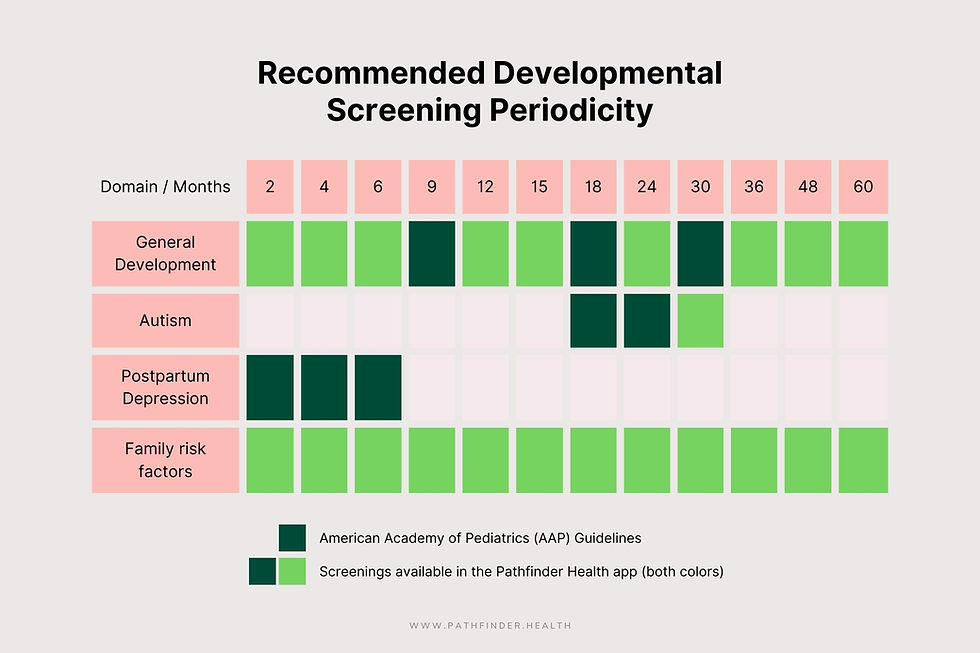The Importance of Developmental Screening
- Paul Patterson, MD, FAAP

- Dec 14, 2022
- 10 min read
Updated: Mar 2, 2024

When it comes to our children, we want to do everything possible to ensure that they are healthy and growing as expected. One way to do this is by making sure that they receive developmental screenings at regular intervals.
In this article, we will discuss the reasons why developmental screening is so critical, the various screening tools used by medical professionals, and the role that you play as a parent.
In this article:
What is developmental screening?
Your child's brain growth
The first five years after your child’s birth are particularly crucial to their health, well-being, and the overall trajectory of their life.
In fact, 90% of your child's brain develops by age 5. This is the time when the foundations for future learning, health, and behavior are established.
During these 5 years, your child will achieve hundreds of developmental milestones–tasks or skills that most children can do by a certain age.
Generally, children achieve developmental milestones in a set pattern: for example, they crawl, then stand, then walk.
Monitoring baby milestones is a way of tracking a child's development and making sure that they are progressing neurotypically.
Pathfinder Health divides child and baby milestones into four major developmental domains:
Motor/movement
Social and emotional
Speech and language
Cognitive.
Each one of these areas is equally important in helping your child reach full developmental maturity.
What does developmental screening do?
Screening is used by medical professionals to detect potential health conditions in people who do not yet show any symptoms.
It allows them to quickly and easily assess risk and identify who requires more comprehensive follow up, such as additional testing.
The type of widespread screening done in early childhood is known as developmental screening.
Developmental screening refers to a formal assessment of the milestones that a child has achieved at a very specific point in time, which provides important insights into how the child is developing, where they might need additional help, and what might come next.
Developmental screening can occur at any time during a child's development but is typically done at regular check-ups.
Screening does not diagnose developmental delays. Rather, it highlights where there is a concern and a child should undergo further examination and possibly developmental evaluation by a specialist.

Why is developmental screening important?
Detecting developmental delays
The prevalence of developmental disorders and delays
Many parents don't realize the importance of developmental screening because they assume that their child is developing on schedule. And in most cases, they are!
However, some children can have delays that go undetected for years–often until they enter school–by which point they have missed years of available services and wasted precious time.
In fact, developmental delays are relatively common. Of the nearly 4 million babies born every year, 20% will have some form of developmental delay condition.
17% of US kids have a mental, behavioral, or developmental disorder.
These statistics are not intended to cause alarm. Rather, they should provide motivation for parents to make sure that their child is screened regularly to catch any concerns at the earliest possible point.
Types and signs of developmental delay
Developmental delays are categorized based on the four developmental domains laid out above.
1. Motor delays
Motor delays can affect a child’s gross or fine motor skills.
Gross motor delays might cause a baby to struggle with holding up their head, rolling, or crawling or interfere with an older child’s ability to walk, climb stairs, or throw a ball.
Fine motor delays can affect finger muscles and can lead to difficulty grasping small objects, using a spoon, or writing. They can also affect the small muscles in the mouth, tongue, and jaw and interfere with the physical actions of speech.
Motor delays also affect a child’s ability to process sensory information and can manifest in a child’s inability to track an object with both eyes or respond to loud sounds.
2. Speech and language delays
Speech and language delays can affect a child’s ability to both communicate with and understand other people.
A child with a language delay might have trouble with receptive language–understanding words and concepts. Or they might struggle with expressive language–the ability to communicate their thoughts.
A child with a speech delay might have trouble articulating words and being understood by others.
3. Social and emotional delays
Social and emotional delays affect how a child interacts with other people and interprets others’ emotions. They might have trouble reading social cues, maintaining conversations, or dealing with change or frustration.
Social and emotional delays can also make it difficult for a child to regulate their own emotions.
4. Cognitive delays
Cognitive delays are delays in a child's ability to think, learn, and remember. They can affect a child's ability to communicate, understand social norms, follow simple instructions, and solve problems. In its more severe form, cognitive delay is referred to as intellectual disability.
A cognitive delay might manifest as a delay in any other developmental category. For example, late crawling, trouble speaking, and weak listening skills can all be signs of cognitive delay.
5. Global delays
“Global delay” is used in reference to children under age five to describe a significant delay in two or more of the developmental domains discussed above or activities of daily living (using the toilet, eating, getting dressed, etc). In approximately 62% of children with global delay, the cause of the delay is unknown.
Accessing early intervention programs
The first 5 years after your child’s birth are particularly crucial to their health, well-being, and the overall trajectory of their life.
In fact, 90% of your child's brain develops by age 5. This is the time when the foundations for future learning, health, and behavior are established.

Because a child's brain grows so much during the first 5 years, this is the time when it has the highest neuroplasticity (the brain’s ability to essentially "rewire" itself to function in a different way).
This flexibility means that treatment has the greatest impact during the early years, especially birth to age three. Screening is the way to identify children who would benefit from early intervention programs and services.
Parent engagement in their child's development
Screening is not just about detecting developmental delays–it’s also about tracking developmental milestones and celebrating your child’s accomplishments!
It’s exciting to know that your child is achieving milestones and fun to understand why those milestones are so significant to their future development.
For more information about the significance of particular milestones as your child achieves them, download the Pathfinder Help app and begin tracking your child's progress!
Types of screening
Developmental screening
Autism Screening
1. Developmental screening
The 3 primary screening tools used today: ASQ-3, SWYC, PEDS
The American Academy of Pediatrics (AAP) recommends 3 developmental screening tools for general developmental screening:
The Parents' Evaluation of Developmental Status (PEDS).
For the most part, parents can complete screening questionnaires themselves--at home, in a doctor's waiting room, or as part of an in-person or phone interview. A caregiver or teacher can also complete the questionnaire. Healthcare professionals then score the responses.
The following table summarizes the key elements of each screening tool.
Below, we compare the details of these three primary screening tools.
The Denver Developmental Screening Test
Another older screening tool, the Denver Developmental Screening Test (DDST), also called the Denver scale, was introduced in 1967.
The Denver Developmental Screening Test was designed for children between the ages of two months and six years and can be used to track developmental milestones in 4 areas:
personal-social,
fine motor,
language,
gross motor.
Although it is no longer on the AAP list of recommended screening tools, the Denver Developmental Screening Test is still used in many other countries.
2. Autism screening
The Modified Checklist for Autism in Toddlers (M-CHAT) or Modified Checklist for Autism in Toddlers, Revised (M-CHAT-R) is a 20-question screening tool designed to assess children at 18, 24 and 30 months old.
It consists of 20 questions--the same questions are used at every age administered--about a child's verbal and non-verbal communication (both expressive and receptive), interest and interactions with other people, ability to pretend, and sensitivity to sound and movement.
Each question is answered simply with "pass" or "fail." Every "fail" response receives one point. Depending on the total score, a child is identified as one of the following categories:
Not currently considered at risk: continue with regular screenings
Medium risk: perform a follow-up interview to clarify responses
High risk: the healthcare provider may refer them immediately for a diagnostic evaluation and early intervention services
Remember that even a finding of “high risk” on the M-CHAT is not an official ASD diagnosis–only a diagnostic evaluation by a specialist can provide a diagnosis.
The M-CHAT questionnaire has been revised to include follow-up questions for children originally identified as medium or high risk and is now identified as the Modified Checklist for Autism in Toddlers, Revised with Follow-Up (M-CHAT-RF).
These follow-up questions consist of a flow chart for each of the twenty M-CHAT questions that include both positive and negative examples and clarify the frequency of certain behaviors.
Because the M-CHAT-RF has added significant clarity to the original, make sure that you are using the latest version if you wish to screen your child.
Frequency of screening
Recommendations
The AAP recommends every child receive developmental and behavioral screening at 9, 18, and 30 months and autism screening at 18 and 24 months.

Actual screening rates
Unfortunately, many primary care providers are not following through–nationally, developmental screening rates are as low as 17%, depending on the state.
There are several reasons for this disparity.
The major reason is simply a lack of time. The average well-child visit only lasts 15 minutes. That's just not enough time to do a proper physical exam, monitor growth, conduct developmental screening, provide immunizations, and address parental questions and concerns.
Additionally, the first signs of developmental delays involve the absence of typical behaviors, not the presence of atypical ones. Your child might not present the signs at a 15-minute well-child visit.
Moreover, many children see family doctors or nurse practitioners, who may not be specifically trained in pediatrics or familiar with the various screening tools.
Finally, many families may require translation services to be able to respond to screening questions, which are often unavailable.
How can you make sure your child gets screened regularly?
Make sure that you bring your child to all of the recommended well-child visits.
If your healthcare provider does not conduct a developmental screening, ask them about it and raise any concerns that you might have.
You can also access screening tools directly from Pathfinder Health. With our app, you simply create a profile for your child and we will remind you when it's time to complete screening questionnaires and prompt you to upload videos of your child that will help us detect milestones.
Put together, this data enables Pathfinder Health to create a thorough but easily-understood developmental report and video reel (1) highlighting the developmental milestones that your child has already achieved, (2) indicating what to expect next, and (3) explaining how you can help your baby and child succeed developmentally.
Other types of developmental monitoring
Formal screening questionnaires are not the only way that early childhood professionals monitor your child's development. They also ask questions about their growth and development, observe their behavior, and monitor any risk factors every time they see your child.
This continuous monitoring of milestones and behavior that happens over a longer period of time is known as developmental surveillance. Surveillance relies on a healthcare professional's own expertise in the field, rather than formal screening questionnaires.
As an example, let's consider an important milestone--walking. The AAP recommends screening at 9, 18, and 30 months.
However, these ages are not ideal for assessing this milestone. 9 months would be very early to begin to walk, but by 18 months, failure to walk would be a potential sign of delay.
Fortunately, the AAP schedule of well child visits includes 12 and 15 months, so a doctor will monitor a baby's progress in walking during those visits even without a formal screening.
At these visits, the doctor sees whether the child can bear weight on their legs and looks at other signs if they are not yet walking.
This way, the child does not have to wait until the 18 month screening to receive additional evaluation or a referral for treatment.
And you also have a role to play in monitoring your child's development!
By regularly using the Pathfinder Health app, you can feel reassured that you are keeping track of the developmental milestones that you observe--when they happen, how frequently they occur, and what else to look for.
Moreover, by uploading brief videos of your child several times a month, you can harness all of the developmental knowledge of Pathfinder Health's smart detection to help you detect more subtle developmental milestones.
Plus, you can add other family members and caregivers to your child's circle of care, so they can also record milestones and observations and upload videos to help our smart detection do its job!
What happens if developmental surveillance or screening detects a concern?
If a developmental screening, your child's healthcare provider, or Pathfinder's app detects any developmental concerns, it does not necessarily mean that your child has any delays or developmental disabilities. It just means that further developmental evaluation and possibly testing is needed to determine if there is a problem.
Your child's healthcare provider will be able to give you more information about next steps and refer you to child development specialists. There are also many resources that you can access through Pathfinder Health!
Services available to young children and their families
While developmental delays may sound scary, it's important to remember that early identification and proper support provide many benefits for infants and toddlers with developmental delays or disabilities and can even change your child's developmental path.
Early intervention services can help your young child learn the skills they need to be successful in school and life, reducing the need for more costly special education and related services later on. The key is to identify concerns at the earliest possible age.
There are numerous publicly-funded and private resources, services, and support programs available to babies and young children with developmental disorders and delays, as well as their families, including:
Occupational therapy
Physical therapy
Speech and language therapy
Behavioral therapy
Applied behavior analysis ("ABA")
Additionally, parents can self-refer to state-provided early intervention programs called Early Intervention Services (EIS).
A doctor's referral is not required for EIS. You can even seek EIS before your child receives a diagnosis–it is available to any child with a developmental delay.
You can find more information and links to EIS on the Pathfinder Health app or the CDC website.
The Takeaway
Remember that developmental screening is not something to fear. It is simply a source of information about your child and how to best help them reach their full developmental potential.
If your child is diagnosed with a delay, they are still the same child.
A diagnosis is simply the means of accessing the best possible treatment and services for both your child and your family.
But the earlier the intervention, the better the outcome will be for your child, so don't delay if you have any concerns.
And remember that you are not alone–there are many resources available to help your child learn and thrive!
Sources:
1. From the Doctor’s Office: California Pediatrician Survey on Early Childhood Developmental Screening. Silicon Valley Community Foundation (June 2017)
2. Hirai AH, Kogan MD, Kandasamy V, et al. Prevalence and Variation of Developmental Screening and Surveillance in Early Childhood. JAMA Pediatr. 2018 Sep; 172(9): 857–866.
3. Kolb B, Gibb R. Brain Plasticity and Behaviour in the Developing Brain. J Can Acad Child Adolesc Psychiatry. 2011 Nov; 20(4): 265–276.







Great post, very well explained. It clearly shows how consistency and strategy matter when building an online presence. If anyone is looking for reliable social media marketing services, GenieFolks offers well-structured solutions worth exploring.
Discover the power of ben wa balls for pelvic strength and pleasure. Crafted to stimulate and tone, ben wa balls offer a discreet, effective workout for your intimate muscles. With consistent use, they heighten sensitivity, improve muscle control, and deliver greater satisfaction, promoting health and sensual confidence effortlessly.
Yasdl مرجعی قابل اعتماد برای دسترسی به نرمافزارهای جدید است.
Steamunlocked builds powerful connections between gamers.
SLOT MAXWIN
SLOT GACOR
SLOT MAXWIN
SLOT MAXWIN